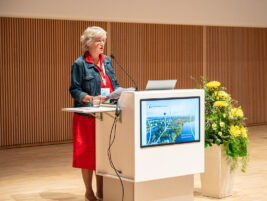A Bridge Indeed
Parenthood and Mental Health. A bridge between infant and adult psychiatry (Editors Sam Tyano, Miri Keren, Helen Herman and John Cox, Wiley-Blackwell 2010).
Pregnancy, birth and the first year of life indicate a major transition process – both for the infant, the newly formed human being, and for the adults who become the baby’s parents. A bridge is formed between non-existence and existence, fantasized baby and a real person, fantasizing parents and responsible caregivers. A bridge is also formed between the embryo, fetus, newborn, infant and the adults who created this individual and will be responsible for its needs. In “Parenthood and Mental Health” Tyano et al. have indeed succeeded in describing in both detail and depth this unique process. At the same time they have established a bridge between researchers and clinicians who study and treat infants, children and adults.
This scholarly and updated book is a very broad collection of chapters written by top experts from all over the world, describing a wide range of aspects including challenging pregnancies, delivery and infancy from the perspectives of both the infant and the parents. A range of approaches are presented – neurobiological, medical, psychiatric, psychological, social, cultural and legal. Normal and abnormal, common and unique phenomena are addressed. For example, research findings on normal variations in mothers’ and fathers’ orientation are presented in Chapter 1. Immediately following is a review on research concerning the surprisingly “competent” fetus in regards to its cognitive abilities. A myriad of situations are presented to illustrate the complexity of pregnancy and the effects on the parents’ preparation for a new role, the care of infants and development in the first year– single parenthood, surrogate pregnancies, unintended pregnancies, adolescent pregnancies, psychiatric disorders during pregnancy, substance abuse during pregnancy, perinatal loss, and others?”
The second half of the book is dedicated to normal and abnormal processes in the first year of the infant’s life. Mishaps such as postnatal maternal and paternal psychiatric disorders, exposure to trauma, poverty, immigration, medical problems in both infant and parents and more are explored.
The book ends with chapters describing the interactions between the infant and parents and treatment modalities to intervene and improve these interactions. The concluding chapter deals with “implication for facilitating ‘good-enough parenting’ in the twenty-first-century world”, namely how the mental health of infants can be improved in resource constrained settings, directly and indirectly, through the improvement of parents’ mental health.
The authors of the various chapters present a very updated and thorough review of scientific knowledge, in a clear and easily readable manner. The book is indeed suited for adult or child mental health professionals who do not have a specific specialty in working with infants, and vice versa, for infant mental health professionals with less experience in working with older children and adults. In this manner it stimulates awareness and collaboration between clinicians who treat different family members of the newly born infant. Such a bridge will surely enhance well being and treatment success. It will also promote collaborations between researchers who study different aspects of behavior and development in different age groups – to the benefit of scientific knowledge and clinical practice.
Authors
Kohn, Yoav, MD,
Director, the Donald Cohen Child and Adolescent Psychiatry Department,
Jerusalem Mental Health Center, Eitanim Psychiatric Hospital,
Hebrew University-Hadassah School of Medicine,
Israel








